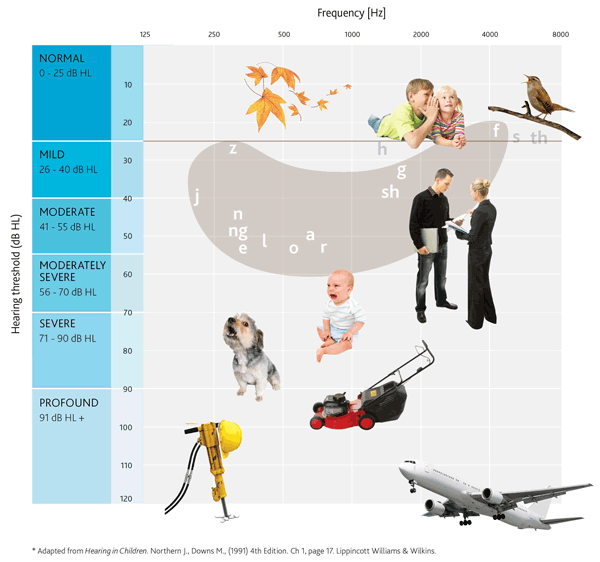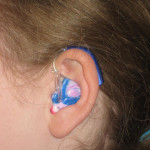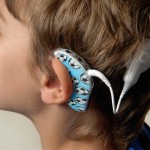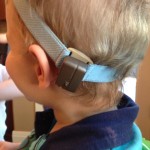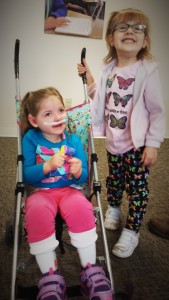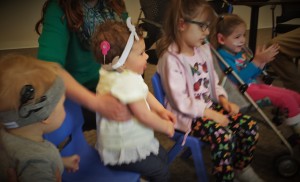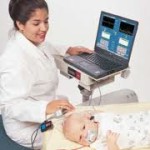 If you have been involved in Early Intervention, one of the first steps in the evaluation process for your child is a hearing test. Your newborn may have passed the hearing screen at the hospital but still have an undetected hearing loss. Any type of hearing impairment may be associated with developmental delays, most notably speech delays. It is important for hearing impairment to be detected early. The good news is that central Pennsylvania offers many support systems and care facilities for children who are deaf or hard of hearing.
If you have been involved in Early Intervention, one of the first steps in the evaluation process for your child is a hearing test. Your newborn may have passed the hearing screen at the hospital but still have an undetected hearing loss. Any type of hearing impairment may be associated with developmental delays, most notably speech delays. It is important for hearing impairment to be detected early. The good news is that central Pennsylvania offers many support systems and care facilities for children who are deaf or hard of hearing.
Click here for more information about Pennsylvania’s initiative for early detection of hearing loss. Click here for more information about newborn hearing screens in PA.
Evaluation
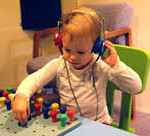 The most common testing is Sound booth testing which involves earphones, sound stimulation and visual rewards. There is also a test that your child may be sedated for that involves electrodes stickers being placed on the skin to monitor the brain’s response to sound. This type of test is called an Auditory Brainstem Response (ABR) test and gives more dependable results than sound booth testing especially if the child has speech, motor or cognitive delays.
The most common testing is Sound booth testing which involves earphones, sound stimulation and visual rewards. There is also a test that your child may be sedated for that involves electrodes stickers being placed on the skin to monitor the brain’s response to sound. This type of test is called an Auditory Brainstem Response (ABR) test and gives more dependable results than sound booth testing especially if the child has speech, motor or cognitive delays.
Interpreting results
The diagram below shows a visual representation of an audiogram. Each time your child has hearing testing you may ask their audiologist to plot their results on an audiogram. This will also help you understand if your child’s hearing loss is progressive or stable as well as how much your child actually hears with and without their hearing aids. The gray shaded area on the audiogram illustrates typical conversation and shows specific speech sounds.
Treatment
If your child has a hearing impairment there are two basic types Sensorineural hearing loss (SNHL)and Conductive hearing loss. SNHL affects the inner ear and its pathways to the brain. Conductive hearing loss occurs when sound is not conducted through the outer ear. Determining which type of hearing loss your child has will determine which type of hearing amplification device they will need.
There are many options for hearing devices which typically come in fun colors and designs for kids. You may choose to go for a neutral color scheme which blends into the hair. If there is a profound hearing loss, then your child may be eligible to begin the process for cochlear implants. A cochlear implant procedure will create a new sound pathway to the brain from the ear. A child will not be considered for this surgical procedure unless they cannot benefit from amplification through a hearing aid.
Support
Call the EI CONNECT Helpline at 1-800-692-7288 for evaluation or to ask questions about Early Intervention services.
Go to the Guide by your side website or email agaspich@pattan.net. This is a program for PA families with children that have hearing impairment that offers personalized support from experienced parents in your area.
Call the WPSD Outreach Center (717) 909-5577 or email jmarks@wpsd.org to obtain information about free classes, workshops and resources. WPSD is affiliated with the Children’s Center of Central PA in Hershey which is a specialized preschool for deaf and hard of hearing students.
To obtain information about ASL classes with the Easter Seals, call (717) 718-3512 or e-mail us at lmarvin@eastersealscentralpa.org. There are other organizations that provide ASL classes through local churches.
Personal experience
I have a child that is hearing impaired. I had observed her reading lips and faces for a year before diagnosis. I just assumed she was curious and unusually interested in my face, which I have to admit I thought was very endearing. When she was diagnosed with bilateral Sensorineural hearing loss, I began reaching out into the community for help and support. I was amazed at how many supports there are in this area.
We see an audiologist every three months to check my daughter’s hearing aids and check her hearing. She enjoys the sound booth testing because they make it fun for her. She really enjoys choosing the color of her new hearing aid molds.
My daughter qualifies for preschool services through the Capital Area Intermediate unit (CAIU) because she has a delay of greater than 25%. She attends a deaf and hard of hearing classroom three mornings a week. Many days she comes off the bus with new signs to teach me. We’ve had a very positive experience with the transition from Early Intervention into the IU classroom.
We participate in a deaf and hard of hearing playgroup at the Western Pennsylvania School of the Deaf Outreach center (WPSD) in Camp Hill and have made some wonderful friends. Our entire family has made efforts to learn American Sign Language (ASL) with classes sponsored by Easter Seals. We have chosen to use a combination of spoken word speech and sign with her. We have attended a deaf and hard of hearing social hour, where ASL is encouraged and speaking is discouraged. It is a great way to improve sign language skills by immersing yourself into the culture. The participants are very patient and encouraging.
I can honestly say that my daughter’s hearing impairment has not impaired her life in any way. In fact, it has changed the rest of our perspectives of her life and ours in a very positive way. When we are out and about, we sometimes get friendly questions or occasionally make an instant friend with another peer who wears hearing aids, has cochlear implants or knows how to sign. We are incredibly grateful for technology, our support through so many avenues, our new friends and our family. Our family has learned of an entirely “new world” opened to us, and we encourage you and your family to discover it.

